Ankh Spread
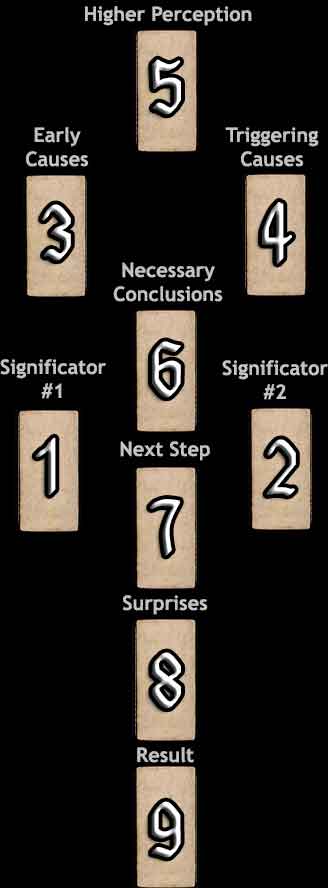
Difficulty: Kind of tough
The Ankh Spread is for questions about the causes behind trends. It is similar to the Celtic Cross and Secret of the High Priestess spreads, but it covers the reasons behind the circumstances in question differently, perhaps giving a better explanation of why things are the way they are.
The loop of the upper section of the ankh reveals the spiritual background and causes of the situation, while the stem of the base focuses on prospects for the outcome.
The first two tarot cards represent the two parent causes of the situation. They will either complement each other or show two opposing sides of a conflict, depending on how they relate. These are the significator cards of the Ankh spread.
3. This tarot card shines light upon the early causes of the trend in question.
4. Pinpoints the causes that triggered the current situation.
5. Reveals the spiritual perspective of the subject at hand.
6. This card examines the reasons why this course of action had to unfold, as a means to this end.
At this point, it is good to pause to soak in the meaning of the first six cards before moving forward to the last three cards. The last three reveal prospects for the future.
7. The Next Step gives clues about the immediate future.
8. Surprising Experiences encountered en route to the result.
9. This represents the result.
Your Ankh Reading
Higher Perceptions 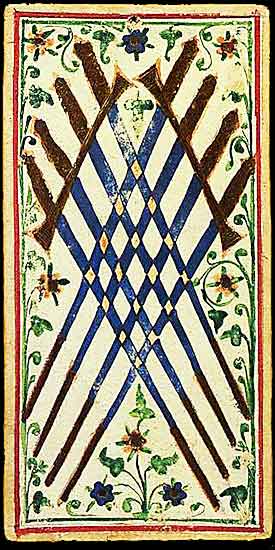 Eight of Swords |
||
Early Causes
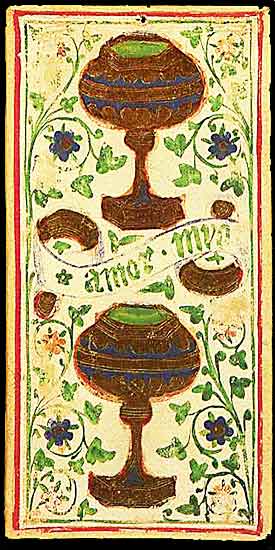 Two of Cups |
Triggering Causes
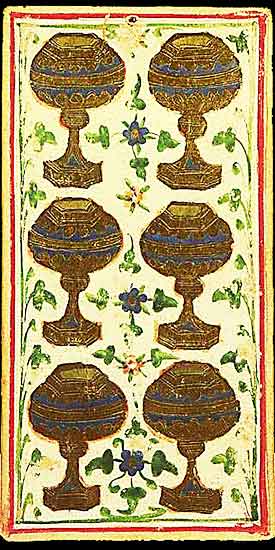 Six of Cups |
|
Necessary Conclusions
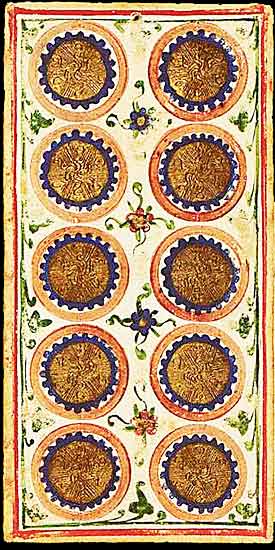 Ten of Coins |
||
Significator #1
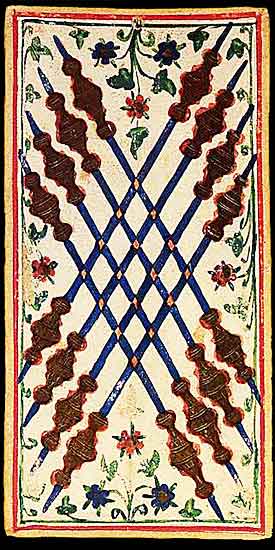 Eight of Staves |
Significator #2
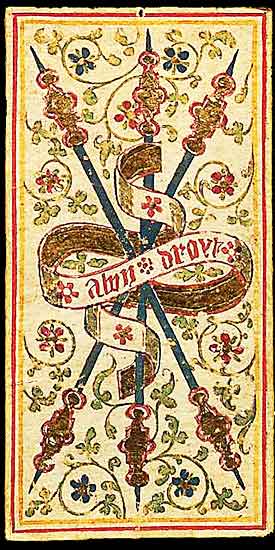 Three of Staves |
|
Next Step
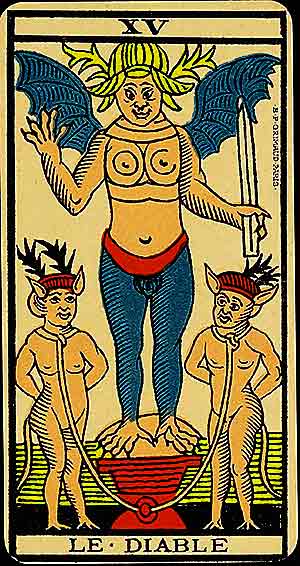 XV – The Devil (Lost card, substituted here) |
||
Surprising Experiences 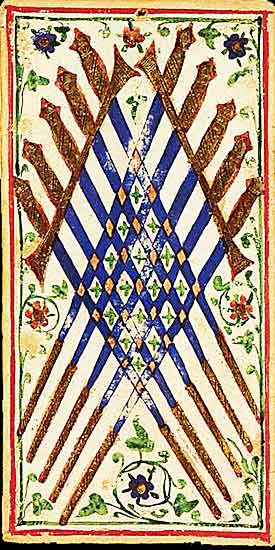 Ten of Swords |
||
Outcome 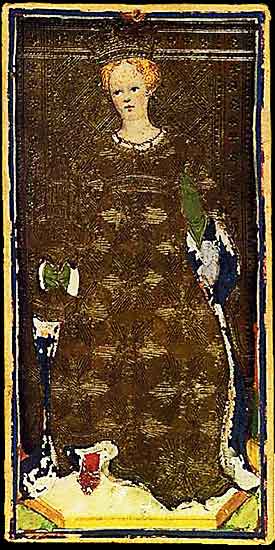 Queen of Cups |

Significator #1
Eight of Staves
The Eight of Staves represents speed, movement, and swift action. It signals rapid progress and the need to act suddenly to seize opportunities.
Symbolism: The eight staves arranged diagonally and flowing in two directions convey a strong sense of momentum and forward motion. The flowery pale tan background allows the focus to remain on the energy and speed represented by the staves, urging you to move quickly and decisively.
In Relationships: Rapid movement or sudden developments. This could indicate fast progress, new developments, or even a sudden romantic spark.
In Work: Swift action or an unexpected opportunity in your career. The Eight of Staves suggests now is the time to act quickly to capitalise on momentum and make the most of what comes your way.
Spiritually: Rapid spiritual growth or sudden insight. The Eight of Staves signals that clarity and enlightenment are on the horizon, and you must act swiftly to harness these energies.
When ill-dignified: Hastiness, impulsiveness, or lack of foresight. This warns against rushing into decisions or actions without considering the consequences.

Significator #2
Three of Staves
The Three of Staves represents progress, expansion, and the results of initial efforts. It signifies a moment of growth where the seeds of potential are beginning to bloom into tangible results.
Symbolism: Three crossing staves evoke stability and forward motion. The slight variations in bark texture symbolise growth, as even though the path is steady, each step brings new lessons and experiences. The harmonious arrangement represents the alignment of efforts, bringing about balance as you move towards your goals.
In Relationships: Expansion of your emotional connection or relationship. The Three of Staves signifies a positive progression, whether in deeper commitment or new shared experiences.
In Work: Growth and advancement in your professional life. This card marks the fruiting of previous efforts and signals that success is on the horizon.
Spiritually: The Three of Staves invites you to continue your spiritual journey confidently, for your path aligns with your higher purpose.
When ill-dignified: A lack of growth or stagnation. This may indicate that you are not making progress or your current actions are not leading to the desired results.

Early Causes
Two of Cups
The Two of Cups represents mutual love, partnership, and emotional harmony. It reflects the balance between two individuals, suggesting that both partners offer their hearts equally. This card symbolises the harmonious exchange of energy and emotional support.
Symbolism: The two chalices, positioned one above the other, reflect equality and mutual respect. The designs on the cups show that while there are differences, they complement each other perfectly. The symmetrical arrangement emphasises the theme of balance and unity in relationships.
In Relationships: Deep connection and mutual understanding with a partner. The Two of Cups signals emotional balance and union, whether in a romantic partnership or a close friendship.
In Work: A strong, supportive collaboration or partnership that brings emotional fulfilment and success. This could represent a productive relationship where both parties work in harmony.
Spiritually: Union with a higher power or deeper connection to the divine. This card suggests emotional balance and spiritual partnership.
When ill-dignified: Disharmony, imbalanced relationships, or emotional disconnection. The Two of Cups can warn of emotional misunderstandings or an unbalanced partnership.

Triggering Causes
Six of Cups
The Six of Cups represents nostalgia, memory, and emotional healing. It suggests a return to simpler times, either through revisiting the past or through healing that allows you to reconnect with the joy and innocence of youth. This card speaks to emotional renewal through reflection and reconciliation.
Symbolism: The six chalices arranged in two neat rows represent order, structure, and continuity. The card's composition evokes feelings of harmony and nostalgia, with continuity between past and present. The ornate designs on the chalices emphasise the beauty of memories and the emotional depth of this reflection.
In Relationships: Reconnection with a past relationship or rekindling old emotional bonds. The Six of Cups speaks to the sweetness of nostalgia and the healing power of revisiting old joys.
In Work: Reflecting on experiences in your career and using them to inform future decisions. This card can also suggest a time to revisit childhood dreams or talents.
Spiritually: A return to emotional balance through spiritual healing. The Six of Cups invites you to connect with the joy and simplicity of your spiritual roots.
When ill-dignified: Living too much in the past, or being stuck in memories. This card warns against becoming too nostalgic and neglecting the present.

Higher Perceptions
Eight of Swords
The Eight of Swords represents restriction, feeling trapped, and mental entanglement. It suggests a period of limitation or confusion, where you may feel stuck or constrained by your circumstances or thoughts. This card points to the mental barriers you may have created for yourself.
Symbolism: The interwoven swords evoke a sense of entrapment or restriction, highlighting how mental or emotional limitations can keep you bound. The design suggests the situation may be self-imposed, and the way forward is through clarity of thought.
In Relationships: Feeling trapped or restricted. The Eight of Swords suggests you may feel mentally or emotionally stuck, but the path to freedom lies in confronting your fears or limiting beliefs.
In Work: Mental or professional restrictions that prevent progress. This card encourages you to evaluate the factors keeping you stuck and break free from limiting patterns.
Spiritually: Spiritual imprisonment or being trapped in limiting beliefs. The Eight of Swords calls for introspection to uncover ways you might be blocking your own spiritual growth.
When ill-dignified: Overthinking, fear, or paralysis. The Eight of Swords warns against remaining in situations where you are not truly trapped but are instead allowing yourself to feel helpless.

Necessary Conclusions
Ten of Coins
The Ten of Coins signifies wealth, legacy, and long-term success. It represents a culmination of efforts that have resulted in financial stability and the ability to pass on a legacy. This card celebrates family, heritage, and the fulfilment of long-term goals.
Symbolism: The symmetrical arrangement of ten coins emphasises completion, legacy, and the culmination of a journey. The rich details of the coins reflect the lasting impact of your achievements.
In Relationships: Stability, commitment, and family. The Ten of Coins speaks to building a lasting foundation for future generations and finding fulfilment in long-term relationships.
In Work: A time of financial abundance and career success. This card indicates that you have achieved a stable and prosperous position, and your legacy is secure.
Spiritually: A sense of fulfilment and the ability to pass on wisdom to future generations. The Ten of Coins encourages you to focus on leaving a lasting, positive legacy.
When ill-dignified: Stagnation, generational wealth without purpose, or difficulty passing on your legacy. The Ten of Coins warns against becoming too focused on material wealth at the expense of relationships or spiritual growth.

The Next Step
XV – The Devil (Lost card, substituted here)
This card no longer exists, so the Marseille version is filling in. The Devil represents bondage, temptation, and the shadow self. It highlights the chains we impose upon ourselves through fear, obsession, or indulgence, urging us to confront these darker aspects to reclaim our freedom.
Symbolism: The Devil embodies primal instincts and the seduction of material or carnal desires. The chained figures symbolise voluntary entrapment, their loose bindings reminding us of the ability to escape our vices. The pedestal signifies false power, while the scene hints at the potential for redemption through self-awareness.
In Relationships: The Devil warns of unhealthy attachments, jealousy, or manipulative relationships. It challenges you to examine whether passion has turned into obsession.
In Work: This card can signify being trapped in a toxic work environment, greed, or overreliance on material success. It urges you to reflect on what fulfils you.
Spiritually: The Devil calls for self-awareness and shadow work. Confronting your inner fears or desires will lead to personal liberation.
When ill-dignified: When reversed or ill-dignified, the Devil signifies breaking free from constraints, overcoming addiction, or realising what binds you.

Surprises
Ten of Swords
The Ten of Swords signifies an overwhelming and painful ending. It suggests a situation that has reached its breaking point, often after a period of mental or emotional strain. This card points to the finality of a difficult chapter and the potential for renewal after a painful conclusion.
Symbolism: The array of ten swords represents the intensity of betrayal, loss, or defeat. The overwhelming nature of the arrangement emphasises the depth of the crisis. The contrast between the swords and the flowered background highlights the gravity of the situation and the possibility of a new beginning once the pain subsides.
In Relationships: A painful breakup or emotional betrayal. The Ten of Swords marks the end of a challenging relationship or emotional chapter but also signals the opportunity for healing.
In Work: The culmination of a difficult period at work, possibly signalling job loss or failure. This card suggests that, while painful, the end of this chapter clears the way for new opportunities.
Spiritually: A painful spiritual awakening or crisis. The Ten of Swords invites you to embrace the lessons learned and recognise that endings often bring new beginnings.
When ill-dignified: A protracted period of suffering or an unwillingness to move on from the past. The Ten of Swords warns against dwelling in pain or allowing it to define you.

The Outcome
Queen of Cups
The Queen of Cups represents emotional wisdom, intuition, and nurturing. She embodies the ability to care for others while staying connected to her own emotions. This card symbolises empathy, compassion, and a deep understanding of emotional needs.
Symbolism: The Queen sits gracefully on her throne holding her cup, suggesting a deep connection to her emotions. The patterns of her gown and the lavish background emphasise her emotional maturity and nurturing energy.
In Relationships: A loving, nurturing energy. The Queen of Cups signifies emotional support, empathy, and an intuitive understanding of love.
In Work: The ability to lead with emotional intelligence and compassion. The Queen of Cups invites you to nurture your creative or emotional projects, guiding others with care and wisdom.
Spiritually: A time to trust your intuition and embrace emotional depth in your spiritual life. The Queen of Cups calls for self-care and listening to your inner emotional wisdom.
When ill-dignified: Over-sensitivity, emotional manipulation, or neglecting your needs while caring for others. The Queen of Cups warns against becoming immersed in others' emotions at the expense of your own well-being.